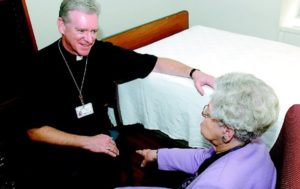Many aspects of our lives have changed in a very short period of time. Coronavirus has changed our lives in unexpected and unwanted ways. Uncertainty has become a way of life. The duration of these changes is unknown and some of these changes may stay with us for a very long time, if not permanently.
We did not choose these changes. People are working from home in the presence of family. Children are making demands for time, attention and assistance with a new way of schooling. Shopping for food and other basic needs has become a time-consuming and unsettling challenge. Everywhere there is fear of coming into contact with the virus. All of this is real. We do not know what is to come.
One aspect of the challenge of living in these times is dealing with death, dying and grief. This is not addressing the threat of death from coronavirus. This is death as it is encountered and experienced in the normal course of human experience. Grief becomes increasingly complicated and painful when the normal rituals and experiences surrounding death and dying are disrupted. During this time of isolation and separation, state, local and CDC mandates have dictated that no more than ten people may gather in one place. In a hospital, nursing home or hospice setting, this narrows to two people, and then only when the care provider determines that death is imminent.
This raises a painful and crucial question: what happens when a loved one is dying and the family is unable to be at their side through the dying process? What happens when a family member is dying and their family is unable to properly say goodbye? What happens when the family cannot gather around their dying loved one to be present, tell stories, share memories and prepare for the separation to come? What happens when familiar funeral rituals cannot be observed at the time of death?
In many of our cultural and religious traditions, rituals provide structure and predictability in the aftermath of death. What happens when the rituals are taken away? Funeral directors struggle with the limitation of ten people gathering and the inability to embalm and prepare a body for viewing if the family so desires. Gathering with family and friends is no longer an option. Conducting a traditional funeral is no longer an option in these times.
These are the rituals humans have relied on for millennia to help us grieve and heal. When this does not take place grief becomes prolonged and complicated. The impact on family and friends is immeasurable. Not being able to be at the bedside to hold a dying loved one’s hand is going to leave scars that may never disappear.
For the grief therapist, pastoral caregiver, counselor or clinician there are no easy answers. There are no tried-and-true protocols. There is no convenient solution or process that will solve the problem of complicated grief. Indeed, complicated grief is not a problem that can be solved.
What will help is wise intervention to assist someone walk through the experience of loss and grief. Many grief therapists, clinicians and pastoral caregivers will be busy helping people grieve. The loss on our rituals such as gathering at the bedside, saying goodbye, giving the patient permission to die, viewing the body and gathering with family and friends to celebrate and observing religious rituals will take a toll that we do not yet know or understand.
As a clinician, therapist, counselor or pastoral caregiver, your role is not to take someone’s grief away. No one chooses to experience grief but it is a natural and necessary human experience. As painful as it is, the bereaved person needs and often wants to pass through the experience of grief as a necessary part of the process of adapting to a new reality.
For the caregiver, some tips may be helpful. Many of these may be familiar, but they bear repeating:
- Don’t say “It will be okay.” (It is not okay)
- Do encourage the bereaved to talk to a grief counselor or competent pastoral care giver.
- Be patient. The process of grieving cannot be hurried.
- Do not impose a time limit. Every individual grieves in their own time and in their own way. Some people grieve for the rest of their lives.
- Grief is not a problem to be solved.
- Don’t say: “He/she is in a better place.”
- Don’t say: “It will get better with time.”
- Grief is not something you get over. Grief is something you learn to live with.
Simply being a listening, compassionate presence is often the best method to help someone move through their grief. One vitally necessary task is for the therapist or counselor to reflect on your own experience of grief. We have all experienced death, loss and grief. We will all experience it again. Grief is an unwelcome but inevitable presence in our lives. And we will live through it.
For more on the Archdiocese of Baltimore’s response to the coronavirus, click here.

